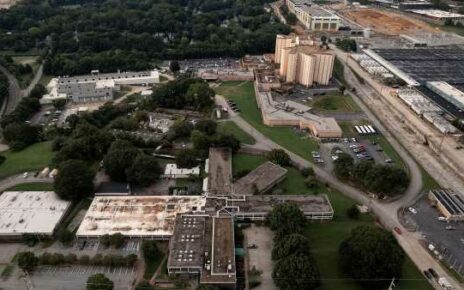Vienna: Iran is escalating its uranium enrichment further by preparing to use advanced IR-6 centrifuges at its underground Fordo site that can more easily switch between enrichment levels, a United Nations nuclear watchdog report seen by Reuters shows.
The move is the latest of several steps the country had long threatened to take but held off carrying out, until 30 of the 35 countries on the International Atomic Energy Agency’s Board of Governors backed a resolution this month criticising it for failing to explain uranium traces found at undeclared sites.
Iran’s underground Fordo nuclear facility outside of Qom, Iran, in a satellite image last year.Credit:Planet Labs/AP
With indirect US-Iran talks on reviving the 2015 Iran nuclear deal long stalled, any further escalation in Tehran’s stand-off with the West risks killing off hopes of reining in the Islamic republic’s nuclear advances and lifting US sanctions against it.
IAEA inspectors verified on Saturday that Iran was ready to feed uranium hexafluoride (UF6) gas, the material centrifuges enrich, into the second of two cascades, or clusters, of IR-6 centrifuges installed at Fordo, a site dug into mountain, the confidential IAEA report to member states said.
Iran informed the IAEA on Monday (Tuesday AEST) that passivation of the cascade, a process that precedes enrichment and also involves feeding UF6 into the machines, had begun on Sunday.
A forklift carries a cylinder containing uranium hexafluoride gas to injecting the gas into centrifuges in Iran’s Fordo nuclear facility in 2019.Credit:Atomic Energy Organisation of Iran/AP
Importantly, the 166-machine cascade is the only one to have so-called “modified sub-headers”, which make it easier to switch to enriching to other purity levels. Western diplomats have long pointed to that equipment as a source of concern since it could enable Iran to quickly enrich uranium to higher levels, including the level needed to make a bomb.
Iran has also not told the agency clearly what purity the cascade will enrich to after passivation. It had previously informed the IAEA that the two IR-6 cascades could be used to enrich to 5 per cent or 20 per cent purity.
“The agency has yet to receive clarification from Iran as to which mode of production it intends to implement for the aforementioned cascade, following the completion of passivation,” the report said, which the IAEA confirmed.
At a different site, it is already enriching to up to 60 per cent, close to weapon grade (roughly 90 per cent) and far above the 2015 deal’s cap of 3.67 per cent. Tehran has breached many of the deal’s limits in response to the US withdrawal from the deal in 2018 and its reimposition of sanctions. It denies seeking nuclear weapons.
In response to the Board of Governors’ resolution, Iran has ordered the removal of IAEA cameras installed under the 2015 deal and pressed ahead with the installation of IR-6 centrifuges at an underground plant at Natanz where the deal lets it enrich but only with far less efficient IR-1 machines.
The 2015 deal does not allow uranium enrichment at Fordo.
Reuters
Most Viewed in World
From our partners
Source: Read Full Article




